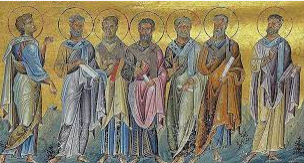
Passing through Galatia and Phrygia
“Meanwhile a Jew named Apollos, a native of Alexandria, came to Ephesus. He was a learned man, with a thorough knowledge of the Scriptures. He had been instructed in the way of the Lord, and he spoke with great fervor and taught about Jesus accurately, though he knew only the baptism of John.” (Acts 18:24-25)
hrough the first missionary trip (Acts 13-14) and the second missionary trip (Acts 15:36-18:22), Paul and his companions expanded the scope of missionary work. Usually, the 3rd mission trip is defined as Acts 18:23-19:20. It can be confirmed that the 1st and 2nd mission trips focus on securing missionary bases, and the 3rd mission trip has a strong purpose of visiting churches that have already been established, so the name missionary trip is a bit awkward in that respect.
Through Galatia and Phrygia
If Paul’s missionary journey, which started from Antioch, was for the preparation of a missionary base before the text, it can be defined as a missionary trip in a different dimension from the 3rd missionary trip. It can be seen as a ministry trip to visit, encourage, and build up churches that have already been planted. Baul recognized that the church, once established, could not be fully maintained, and tried to emphasize and reaffirm the need to stand firm theologically. It is because we have already experienced that if we often hear different and contrasting theological positions, the gospel of God towards the Gentiles can be corrupted and the church can fall into confusion.
In addition, it was emphasized that the Church of God, established in each region, is not a singular existence, but a united body centered on Christ. It was often mentioned that all churches are connected with Jerusalem as the center. In order to emphasize this point, when the Jerusalem church was in trouble, they collected and delivered relief funds and appealed to other local churches to help each other when they were in trouble.
Ephesus
Paul’s party headed back to Ephesus. Ephesus was the capital of the Asian province of the Roman Empire. From Acts 16:6 we can guess that Paul was trying to do missionary work in Ephesus. At the end of the second missionary journey, Paul established a base in Ephesus just before leaving for Jerusalem and left behind Priscilla and Aquila (18:19-21). It is thought that Paul probably tried to focus on missionary activities centering on Ephesus in the future. If Jerusalem, Antioch, and Corinth had been important mission bases, Ephesus has now joined the ranks.
Apollos
He began his third missionary journey by going through the lands of Galatia and Phrygia one after another to make disciples. And before they reached Ephesus, something important happened there. It was confirmed that Apollos preached the gospel in the synagogue and attracted the attention of the church.
Apollos was born in Alexandria. Alexandria was the second largest city in the Roman Empire and the center of Greek-Jewish biblical hermeneutics and philosophy at the time. Apollos was a biblical scholar, fluent in rhetoric and eloquent (v. 24). Where he received Christian teaching, when and how he experienced the Holy Spirit is not known. Nor is it known how such a person could know only the baptism of John the Baptist and not the baptism in the name of Jesus. This fact is further enigmatic as we hear the same words of Apollos from some of the disciples at Ephesus (Acts 19:1-3).
The saints in Ephesus had not yet formed an independent church and were attending synagogue services. Aquila and Priscilla urged Apollos to be baptized. They convinced Apollos that the gospel could and should be preached to the Gentiles as well (recognizing that this was God’s will). Apollos had already gone to Corinth with a letter of recommendation from the Ephesian church and helped the church there through apologetics as a biblical scholar.
The situation in Corinth was not rosy. In the confrontation with the Jews, it was difficult to respond theologically to them. Apollos was a great help to the Corinthian church because he had a special gift. The Jews could not overcome the logic of Apollos who proved through the Bible that Jesus was the Christ. When this happened, the Jews forbade Apollos to preach in the synagogue, and discussions broke out in the street. After this, Apollos became an important co-worker of Paul and joined Paul in his missionary journey. Paul’s letter to Corinth (1 Corinthians 16:12) states that he will not be able to go to Corinth with Timothy because he has too much to do with Paul.
Think about
Mission consists of laying the groundwork by preaching the Word and continuing the process of nurturing. Paul laid the foundation through the first and second mission trips and tried to establish the church firmly through the third mission trip. The missionary center is expanding from Jerusalem to Antioch, from Antioch to Corinth, and from Corinth to Ephesus. It is time to check whether our mission base is also expanding.
The Ephesian church gained great strength through Apollos. In particular, it was possible because he had abundant Bible knowledge and good speech. Even today, various heresy editorials confuse the church and believers. We are not all people who have received outstanding gifts like Apollos, but at least we should stand clearly on the Word ourselves and be able to convey it to our neighbors. I am sure that by doing so, the church will grow and become strong.
President Sung Jin Lim
World Mission University
